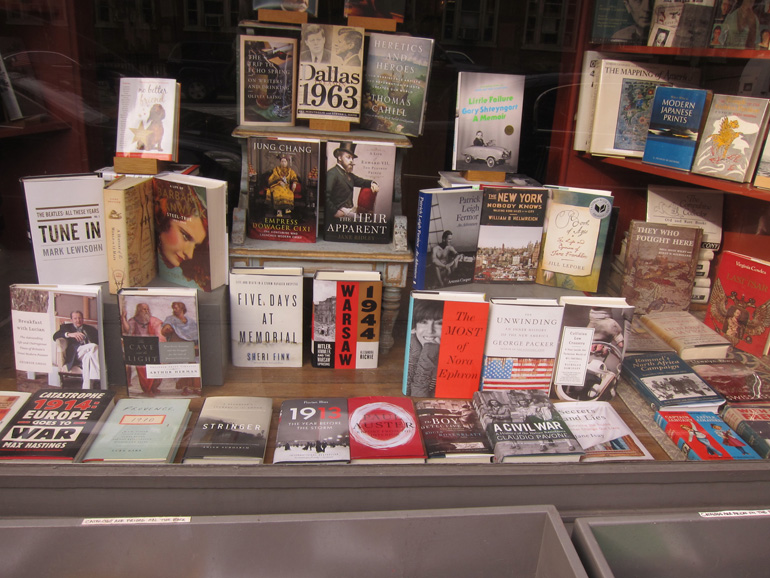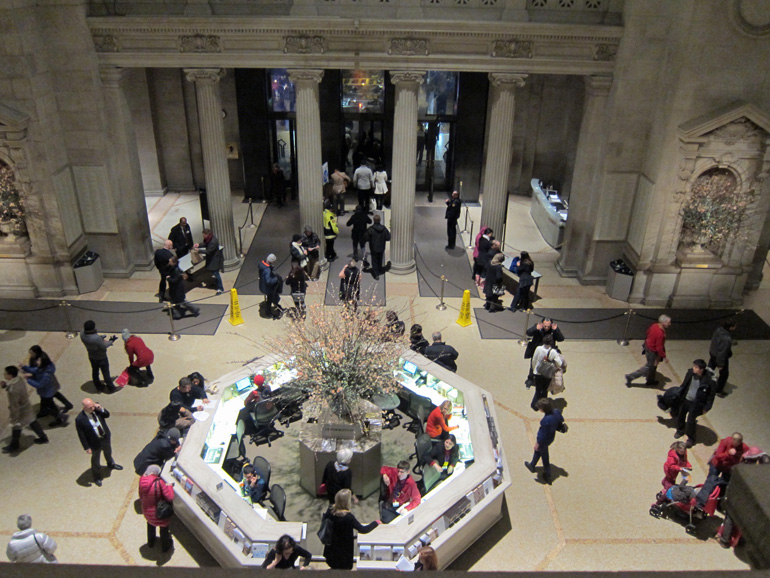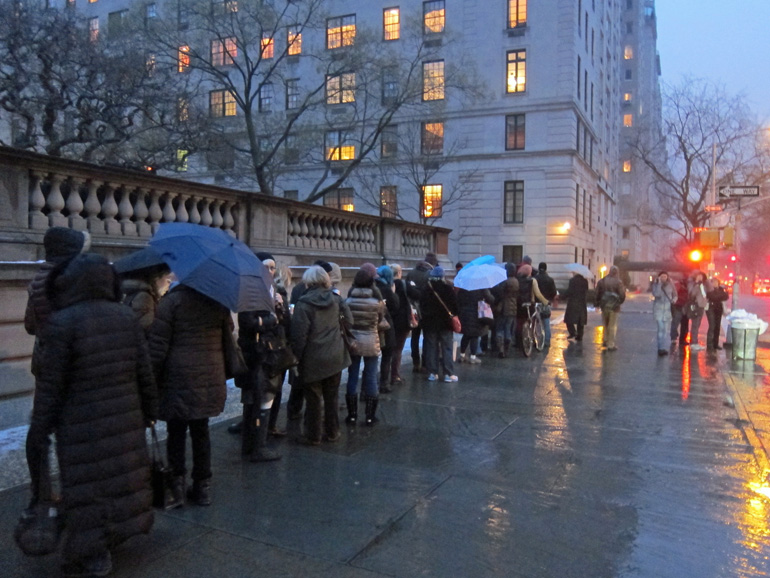Gotham Diary:
Radical Elements
31 January 2014
Friday, January 31st, 2014
When did this happen? When was the Alan Garage disfaced? Who let the barbarians in?
Somewhere, I must have a photograph of the old facade, a terra cotta triumph. You can read about it in a “Streetscapes” column from way back in 1989, when Christopher Gray was writing up the development of the old Orpheum Theatre site. Thanks to his piece, I learned how the old garage, built in 1930, and the small hotel next door (the Franklin) got their names.
One shudders at the illiteracy of the Meyers Parking people. Why not just junk the old name? Why mount “Allan’s Garage” on a brutalist sign? Getting it wrong adds insult to injury. And the injury is not inconsiderable. The Alan Garage was one of the minor marvels of Yorkville. (There are no major ones.)
I took the picture, however, because I have always been curious about the “Shaftway” signs that appear on buildings throughout the city, presumably to signify that the windows (which are usually blacked out) open onto elevator shafts. Or maybe just shafts, in the very old days, with pulleys at the top. Here’s my question: who is the intended reader of these signs? Whom are they designed to notify, and about what? All I can think of is that second-storey men might find the warnings useful, but why would the city fathers worry about the likes of them breaking their necks?
Ah, these modern times! I have but to ask. Firemen, that’s who the signs are for. D’you know what? I think I knew that, and then forgot.
***
Yesterday, I devoted about three hours to translating three sentences of Confucius. Why do I say that? Translation had nothing to do with it. In fact, I was learning how to read the three sentences in Chinese.
How much time you devote to following the rest of this entry is, of course, entirely up to you. I’ve taken it upon myself to explain a few things about written Chinese that may be of no earthly interest to you — but you never know. I thought it worth the exercise. Can I make this intelligible? Can I make it interesting and intelligible? Can I convey the great but rather serious fun of dissecting an ancient text that seems to have unusual pertinence? All I’ll say is, I’m sure that it might be better done. I won’t find out how, though, until I give it a try.
My objective is to understand Analects 13.3 as well as I can, and on a matter of importance that I have mentioned before and for which I should like to conceive a better label than “rectification of the names.” I could trust the translations, and in fact I do trust them, but I want more; I want to get a feel for how Confucius expresses himself. To do that, I have to know something about Chinese (namely, how to look up characters in a dictionary), but I’m finding that I also have to know something about teaching myself. I have to devise a practice for studying Confucius in his native language. I have always played with Chinese before, as you might play with a bar puzzle or a word game. My present inquiry — studying Confucius — demands method as well as rigor. How do I find them?
I begin with the text — the Dover reprint of the 1893 edition of the work of Confucius prepared, with a translation, extensive notes, and a glossary of characters, by James Legge, an Oxford professor who set out in 1839 as a missionary to China, returning to England in 1873. There are seven sentences in 13.3. Being me, I began in the middle, with the fourth sentence. The first three sentences are relatively shorter, and I’ll find out how long it takes to work through them after I have posted this entry.
Once I have found a character, in the dictionary or elsewhere (I’ll come back to that), I write down its Pinyin romanization. This is invariably a syllable with an accent mark that signifies one of four tones. Then I copy the character. If the character has been simplified, I copy that as well. I have learned to write down the number of the character’s radical directly beneath the Pinyin. Then I write a word or two of definition, unless the character is one of the many that don’t yet have a clear meaning to me.
Given favorable winds, I find each character in the normal way, by recognizing its radical. Until very recently, Chinese characters, which were and still are pronounced differently throughout the country, were organized around the idea of radicals. There were 214 of these. They were all characters in their own right, but they were also components in other characters, which were formed by adding strokes to the radical elements. To get anywhere in written Chinese, you had to know your radicals; you had to be able to “see” one of them in any given character. Once you got used to it, it was fairly straightforward. Radical 50 (which looks like a small square or rectangle), plus four other strokes: jÅ«n: “monarch,” according to the dictionary (Oxford), but for Confucius the first half of a compound translated as “superior man” by Legge, and as “gentleman” by Simon Leys. Some radicals, however, were hard, at least for me, to discern. One dictionary that I used to use had a listing of “difficult” characters, grouped by total stroke count. You will see, then, that you have to know how to write a Chinese character before you can look it up. The little box of Radical 50 (formerly 30) is comprised of three, not four strokes.
In contemporary dual-language dictionaries, characters are organized by their Pinyin romanizations. The Pinyin convention for representing the sounds of Chinese as it is spoken in Beijing is officially recognized by the Chinese government. Dictionaries still provide tables of radicals at the beginning, but if you know how a character is pronounced, you can dispense with them.
The winds are frequently unfavorable: I don’t recognize the radical, or can’t find the character listed under the radical that seems clear to me. More often than I’d like admit, I simply miss the character, overlooking it where it belongs; I have correctly identified the radical. Sometimes this is the result of carelessness, but often its a failure to recognize the character in a different typeface. The 1893 typeface is massively woodcut: it looks tremendously Chinese-ey. (I spent twenty minutes looking up what I took to be a different character for “foot” because of a defect in one of the woodcuts.) The dictionary’s type face is far more rectilinear, and the lines are really lines, not the brushstrokes of traditional Chinese writing.
And, not infrequently, the character has been simplified. That’s to say that a less complicated character, with far fewer strokes, has been substituted for the traditional one — the one that appears in Legge’s 1893 edition. Simplified characters are official in the People’s Republic of China and, increasingly, used by scholars around the world. (They are, after all, often the work of scholars of the past, constituting a shorthand that allowed notes to be taken more rapidly.) The simplified characters are not, however, in use in the Republic of China (Taiwan), or — last time I looked — in the Chinese-American press. What makes simplified characters such an awful pain for anyone schooled in traditional Chinese characters is that many quite common radicals have been simplified. Take the traditional 149th character, which means “words.” In my traditional dictionary, the characters classified under Radical 149, and all of their more common compounds, run from page 1482 to page 1529. As it happens, the traditional radical has been retained as a character, but it is not much of a radical anymore, as most of the characters formerly classified with it have been reassigned to a two-stroke radical that doesn’t mean anything.
Having taught myself the traditional table of radicals pretty well, back in the early Seventies, I effectively stopped studying Chinese for a long time rather than deal with the simplified characters, radical lists of which, unlike the traditional one, are not standard. I don’t know how many there are, but I have two right here on my desk, the one in the Oxford dictionary (the one that I use), and the one in a devilishly handy study guide, published for I can’t imagine whom, called Reading and Writing Chinese: A Comprehensive Guide to the Chinese Writing System. Quite often, I go straight from the dictionary’s table of radicals to the study guide, via the Pinyin — which is why the Pinyin is the first thing that I write down. Chances are that the study guide will show me how to write the character properly. I know the basic rules, but I’m making more of a point of doing things properly. As you can see, I eventually got over my “sunk costs” attachment to traditional characters. Happily, both the dictionary and the study guide provide the traditional versions alongside simplified characters, or else I’d be lost.
Sometimes I find the character in reverse. Knowing what it means, I look up the word in the English half of the dictionary and then trawl through the listing in search of the character that I’m looking for. The Oxford dictionary, as is conventional now, will give both character(s) and Pinyin, for the Chinese half of the dictionary is arranged alphabetically — by Pinyin. And a funny alphabet that makes: A, B, C, D, E, F, G, H, J, K, L, M, N, P, Q, R, S, T, W, X, Y, Z — the letters omitted from this list never appear at the beginning of Pinyin romanizations, and the omitted consonant — V — isn’t used at all.
Traditional Chinese-English dictionaries work differently. They arrange the characters in the traditional manner, by radical. On the first page of the dictionary proper (after the tables of radicals), you will find the first radical — the straight horizontal stroke that signifies “one” — followed by the characters that add one stroke to the radical; in my traditional dictionary, a rebarbative tome that dates from the Legge era (also a reprint, of course), the second listing is the character for “seven.” And so it goes, all the way to Radical 214, which consists of seventeen strokes and denotes, among other things, a flute. The last character in the dictionary adds nine strokes to this radical, to mean “implore” — one almost suspects a Christian interpolation, as all the compounds listed for the character suggest a distinctly Occidental fervor. But I’ve forgotten to mention: the table of radicals in a traditional dictionary directs you to the page where the definition is given.
Three characters that appear in the sixth sentence of the passage that I’m studying, meaning “ceremonies,” “music,” and (more or less) “flourish,” consist of many strokes — and positively occult radicals. (Well, they give me trouble.) I had a very strong, and, it turned out, correct, hunch that they had been simplified, so there would be no point looking for them in the Oxford dictionary. Following the basic method, I should have had to look them up in my traditional Chinese dictionary, which employs not Pinyin but an older system, known as Wade-Giles. Assuming that I found the characters in the traditional dictionary, I should have to hunt for the corresponding Pinyin, something I’m not very good at. Avoiding this headache, I looked up the three words in the English half of the dictionary, found what I was looking for, and copied the simplified versions of the characters alongside the traditional ones taken from Confucius. In two cases, identifying the simplified character’s radical was easy, but the one for “music” really stumped me for a while, until I got to the end of my rope, and there it was.
Hunting for radicals even after I’ve identified a character isn’t really necessary to attaining a better understanding of Confucius, except, who am I to say such a thing? If I want to understand Confucius’s text, I have to know the characters, and to know the characters implies knowing the radical, even if the character in use today no longer resembles the one in Confucius. In short, instead of beginning by deciding all the things that I don’t really need to bother with, I’m bothering with everything that seems pertinent to the text. This seems to be a more properly Confucian method.
The last step is to write out the Pinyin romanization of the text. This will help me to read the text aloud, and eventually I’d like to be able to read straight from the original, giving Kathleen the romanized text (and showing her how to follow it). Only then will I try to parse the characters that are at all obscure. Confucius was writing, after all, two and half millennia ago (roughly), and even as conservative a language as what used to be called “Mandarin” is bound to change a bit. We have in any case moved far from the agrarian world, dotted with watchtowers, that provided the meaningful referents in Confucius’ time. I want his words to tumble in my mind.
I don’t assume that Confucius has the answers. But he does seem to have a method, a line of inquiry, that stresses virtue as a social good. In the West, we have come to regard virtue as optional, almost vestigial. As long as you don’t break the law, you’re doing fine; and one man’s virtue is another man’s vice. I don’t like depending on law and order; a police state is no better than a nanny state. Our only hope of doing without either is to develop a flexible sense of social virtue, modest in scope but clear and comprehensive as regards public spaces, and considerate of the consequences to the world tomorrow. I think that Confucius can help me to identify a few basic principles. He has, for a start, inspired me to read him with respect.
I said something about fun, didn’t I. Oh dear.




















